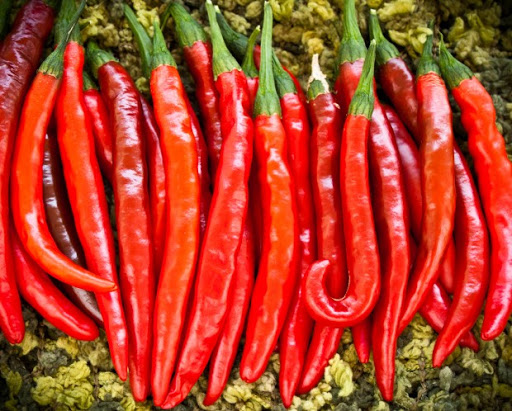Rwanda’s chilli exports increased from 357,000 kilogrammes to 721,000 kilogrammes in 2018-2019, according to statistics from NAEB.
Rwandan exporters who had sent shipments of chilli pepper to the United Kingdom (UK) market are crying foul after their produce was held for inspection and got damaged along the process.
Speaking to The New Times, Robert Rukundo, Chairman. Horticulture Exporters Association of Rwanda (HEAR) interceptions of produce are normal for safety reasons but noted that this case is unique in that the produce was kept for long for testing by plant health certification agents in the UK and ended up being damaged.
Rukundo said that the spoiled chilli belonged to four exporters and was is estimated at more than six tonnes.
He indicated that the chilli was shipped between July 3 and 10th 2020, but they were declared free from a virus on July 15.
“They were held over virus suspicion. Later, they were found to be virus-free. But the time lag is the issue. Normally, the test procedures are supposed to take no more than five days. So, perishables don’t go beyond that time. But now, it went to up to 13 days,” he said.
Fred Rwigamba, the Director of Finance and Operations SOUK Investment Group, a firm engaging in growing and exporting fresh horticulture produce from Rwanda, told The New Times that on July 9, 2020, his firm exported a consignment which consisted of 466 packs of green chilli, and 336 packs of hot pepper.
Also called habanero, the hot pepper is a type of chilli with a sharply hot and strong taste.
Rwigamba said that the green chilli was cleared, but the hot pepper was held for further testing ‘over virus suspicion’.
He said that the 336 packs of hot pepper – equivalent to 1.32 tonnes or 1,320 kilogrammes – was worth £4,455 (about Rwf5 million) in monetary value.
He said that though the results of the pepper exam showed it was safe and of quality, they came late as the produce was already damaged.
“We lost all that money. Because it is a perishable product, it was damaged upon its being released such that our client in London could not buy it,” Rwigamba said.
He wondered why only packs of hot pepper were held while those of green chilli got a pass yet both the horticultural products were from the same farms and had gotten standards certification from the Rwanda Inspectorate for Competition and Consumer Protection Authority (RICA).
Meanwhile, Rukundo expressed worry that the exporters risk being charged £2,000 as cold (room) storage cost, yet their produce was impaired.
“Storage fee should serve the purpose. If the product is in not in good condition, why do you pay for the storage fee?” he wondered.
“If compensations are made for the damaged produce it would be a boost for us to be able to run our businesses,” he said.
Proposals to prevent similar cases in the future
Going forward, Rwigamba requested that the procedures should be expedited so that they get results before the product is spoiled.
“Testing produce should be done because different countries have different standards. But, results should be released on time, for instance within 24 hours,” he said.
He said that there should be effective collaboration between Rwandan and UK phytosanitary (plant health) inspection organs in order to address the exporters’ concerns.
Beatrice Uwumukiza, the Director-General of Agriculture and Livestock Inspection and Certification at RICA said that normally when given agricultural produce is intercepted by an importing country [over standards concerns], it informs the country from which the produce originated.
However, she said that she has not yet received any report from the UK about the interception of the Rwandan chilli.
Chilli pepper is one of Rwanda’s emerging export crops and it has shown the potential for growth.
Meanwhile, Rukundo underscored the importance of ensuring good farming practices and quality and safety of horticulture produce from farm to market.
Rwanda’s chilli exports increased from 357,000 kilogrammes which earned over $484,000 in 2017/2018 to 721,000 kilogrammes that fetched over $1 million in 2018-2019, according to statistics from the National Agricultural Export Development Board (NAEB).
Overall, horticulture has proven to be a game-changer in Rwanda’s agricultural exports as current trends suggest that it is growing faster than tea and coffee, which have been Rwanda’s top export crops for decades.
Culled from Newtimes

